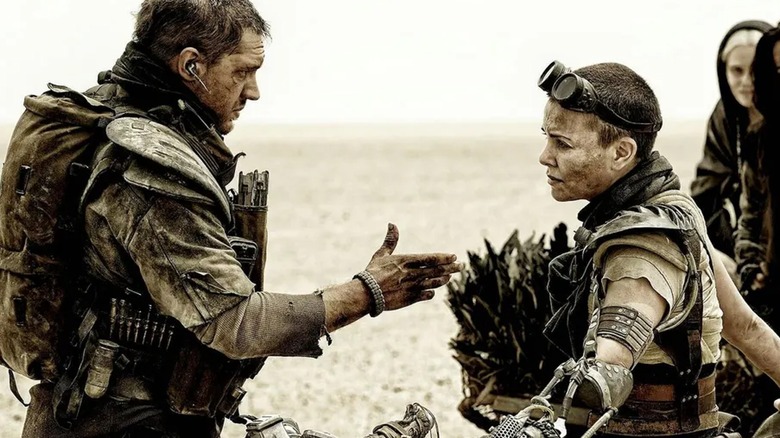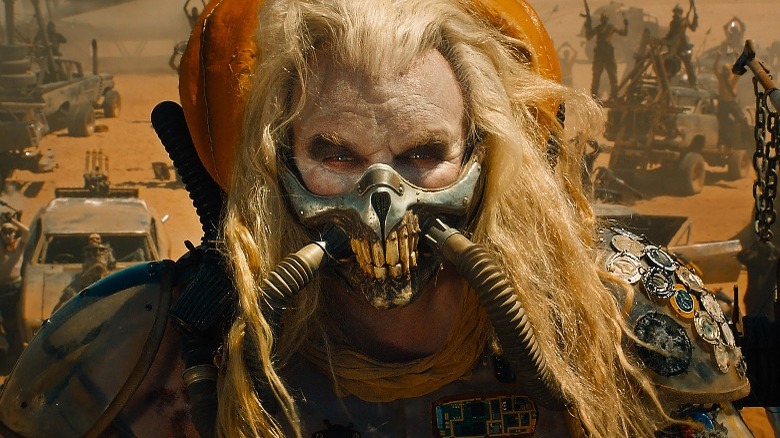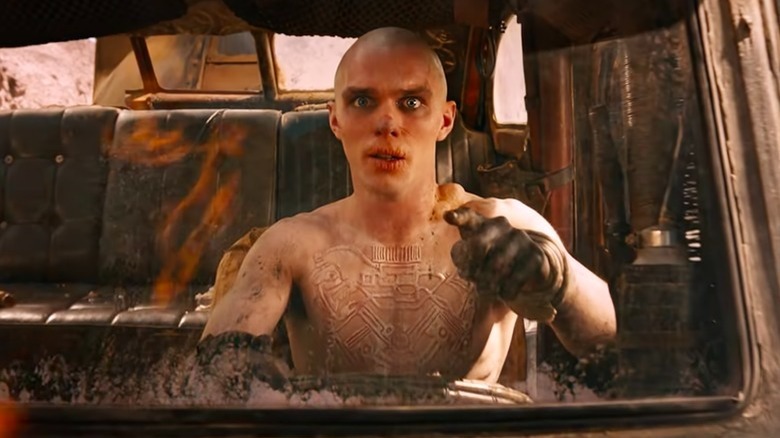Mad Max: Fury Road's Character Names Have Surprisingly Simple Origins
Immortan Joe. Toast. Nux. Slit. These are some of the names of the characters that populate the wild, apocalyptic wasteland in George Miller's breathlessly exhilarating "Mad Max: Fury Road," which revisits the world of the original trilogy. While the technical terms used to describe "Fury Road" is either "reboot" or "sequel," Miller likes to think of it as a fresh foray into familiar territory, with the stakes being higher than ever for our ever-reluctant hero, Max Rockatansky. Considering that the world Max inhabits is a cruel, barren dystopia, it is rather fitting that the names of the characters are as distinct and eccentric as the socio-political circumstances that shape and reshape the social strata of a world on the brink of extinction.
It is important to note that weird character names have always been a staple in the "Mad Max" franchise. Miller's original film featured dudes named Mudguts and Toecutter, while "Beyond Thunderdome" consisted of characters such as Scrooloose and Ton Ton Tattoo. The same tradition is adopted in the comics — created by Miller, Nico Lathouris, and Mark Sexton — which always opens with an omniscient narrator named Wordburger, whose name is supposed to roughly indicate his role within the ambit of the story. There is a fairly intuitive aspect to these names, as even those who are unfamiliar with Miller's pre-"Fury Road" entries can immediately grasp the essence of a character based on their name, especially when contextualized against their function within the crumbling societal structures of their world.
While "Mad Max: Fury Road" constructs a world that has a solid foundation in well-crafted lore and hidden, fleshed-out backstories, the character naming traditions, while not arbitrary, stems from a rather simple, straightforward source according to Miller himself: creative fever dreams.
What's in a name?
In a conversation with Fandango about the making of "Fury Road," Miller was asked to explain the process of coming up with the names in the film, and he talked about where they originate and how they're created:
"Fever dreams... if they stick. But they always have to be appropriate for the world....One of the things is that everything in the story has to have some sort of underlying backstory. Not just every character, but every vehicle, every weapon, every costume – and the same with the language. So [the concept] was always found objects, repurposed. Immortan Joe is a slight adjustment to the word 'immortal.' The character Nux says 'mcfeasting' instead of using the word 'feasting.'"
As "Fury Road" unwraps its cruel, brutal world at breakneck speed, it can be challenging to keep up with the inner workings of its world, which are often never explicitly explained but presented as a natural, inherent component. In spite of this, the film succeeds in pulling audiences in because Miller knows exactly what every object, character, or costume represents, which allows the story to feel grounded and naturally coherent even when things that are alien or outlandish to our reality are introduced.
For instance, Miller explains that the name Slit simply conveys the gesture of one slicing one's throat, which explains the character's extremist behavior, even as a War Boy. Also, Slit's self-mutilating instincts lead him to reopen and stitch back his wounds repeatedly, which earns him his name in the first place. Miller also said that The Dag is his favorite character name, because "in Australia, the Dag is sort of a goofball-type," which lines up with her personality pretty well, as she is seen mocking Immortan Joe to make the other wives laugh.
Why names matter in Fury Road
Even the wildest fever dreams are rooted in the bedrock of meaning-making, and how and when names are uttered (or not uttered) in "Fury Road" reveal a lot about a character's intentions and place within the film's world. The most transparent example is Immortan Joe — his name intuitively conveys his importance as leader, as the War Boys chant his name with reverence. When The Organic Mechanic drops the "Immortan" and simply calls him Joe, it hints that he does not necessarily worship him as a godlike figure, although he does respect his status.
Furiosa, whose name paints her as the rebellious warrior she is, initially refrains from addressing the five wives by their names, as she does not wish to form any emotional attachments with them. In contrast, the fact that she asks for Max's name when she wants him to fight alongside her denotes how she holds their possible alliance in high regard. Moreover, the War Boys go unnamed when referenced by others, as they are simply cogs in the machine, brainwashed cultists meant to fulfill a purpose. The War Boys, however, all have names, and address each other as such because they do not necessarily have a strict hierarchy amongst themselves.
This is also the reason why Joe asking Nux his name is such a pivotal turning point for the latter. For the first time, a War Boy is treated a little more than a machine, as a person even, granted a special purpose for his death to mean something more. As Nux embraces his humanity along the way, he also changes the way he treats others around him, uttering their names as a way of acknowledging them as folks of equal status. In "Fury Road," as in real-life, names have power.


